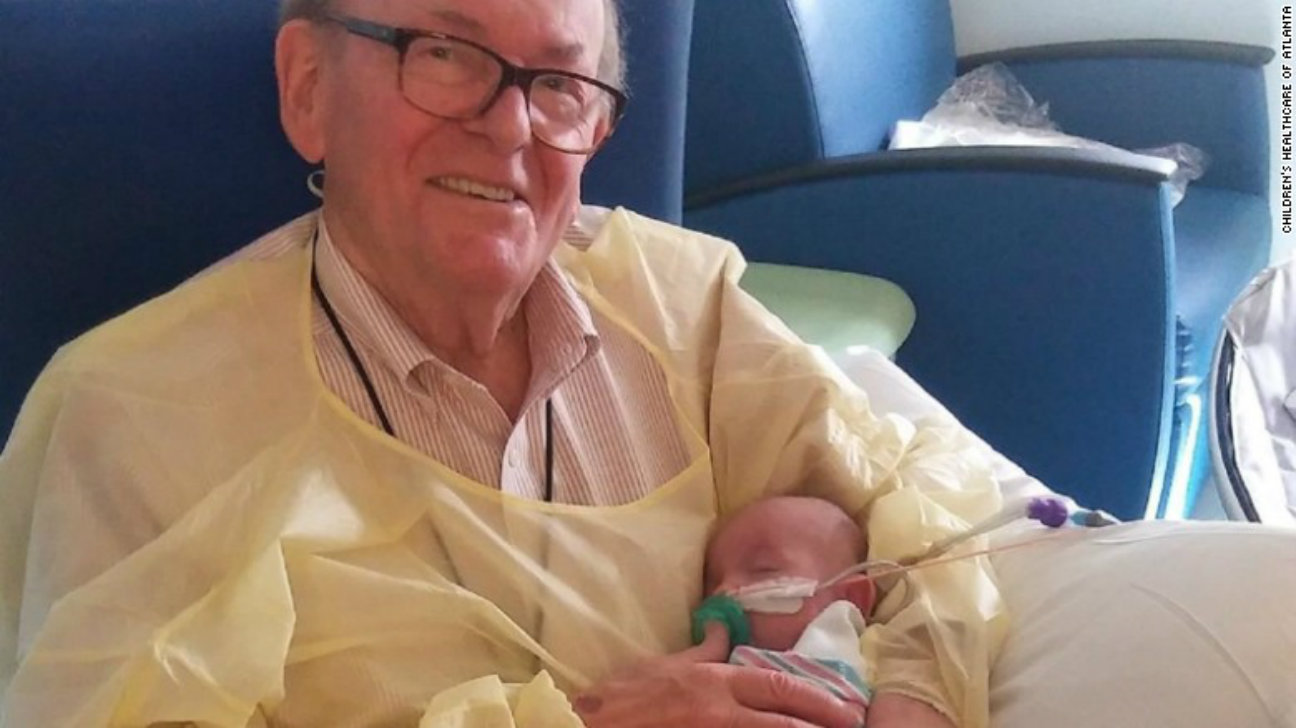
Cuddling newborns is making headway in neonatal intensive care units (NICUs) across the country as a crucial part of the treatment plan for babies born addicted to opioids.
A baby is born addicted to opioids every 25 minutes, adding up to more than 21,000 babies each year, a study published in the Journal of Perinatology found.
Inevitably, each baby must endure severe symptoms of withdrawal. This is known as neonatal abstinence syndrome (NAS).
Symptoms begin anywhere from 24 to 72 hours after birth. The most common symptoms include visible tremors, piercing screams, vomiting, difficulty breathing and sleeping, fever, sweating, and the inability to eat.
“Maybe six months ago, I was with an infant whose mother was on methamphetamine for the entire pregnancy,” David Deutchman, NICU volunteer at Children’s Healthcare of Atlanta, told Healthline. “The baby was miserable, and there’s only so much methadone that you can give them to ease their symptoms.”

The primary treatment protocol for babies with NAS is to substitute another opioid such as methadone or morphine, and very gradually reduce the dosage to ease the intensity of the withdrawal process over the course of days or weeks.
Deutchman, known to many in Atlanta as the “ICU Grandpa,” said he held a baby girl for nearly 40 minutes before she was able to calm down and stop screaming.
“The nurses said she had been up screaming for the entire first 24 hours at the NICU. Usually when I hold a crying baby in the NICU, I can calm them down within 30 seconds, or maybe a few minutes,” explained Deutchman.
The former marketing executive, now 83 years old and a grandfather of two, has been volunteering two days a week in the NICU for 12 years and counting.
“I was only able to calm this baby girl by whispering to her very quietly, stroking the side of her head, and holding her snuggly in my arms,” he said.
When she did fall asleep, Deutchman said she slept for two hours in his arms.
“She wasn’t going to wear me out,” Deutchman said of her screaming. “It doesn’t matter that I just met her, I was going to hold her until she was comfortable and able to sleep.”
Less medication and shorter hospital stays
Like opioid addiction in adults, the withdrawal process can be fatal for babies unless medical intervention begins shortly after birth. And traditional medical intervention is neither cheap nor simple.
A costly hospital stay for a newborn addicted to opioids can add up to nearly $66,000 or more, compared to an average non-NAS newborn’s hospital costs of about $3,500, according to the National Institute on Drug Abuse.
While the average baby leaves the hospital after 2.1 days, babies with NAS spend 16.9 days in the hospital.
The “No Baby Unhugged” grant program, funded by Huggies diapers, is trying to make a difference in a simple yet impactful way.
“No Baby Unhugged” is a grant designed to establish volunteer-based hugging programs at NICUs across the country, ensuring that newborns receive extensive amounts of soothing human touch.
While cuddling and hugging newborns enduring withdrawal isn’t new, it is gaining a great deal of traction. It’s also proving to make traditional drug intervention unnecessary for many.
Dr. Elisha Wachman, neonatologist at Boston Medical Center (BMC), told National Geographic that many babies with NAS are overmedicated.
Wachman explained that in many cases, the methadone treatment approach can actually prolong the arduous withdrawal process and extend a baby’s hospital stay.
Ensuring that babies with NAS receive plenty of hugging and cuddling from NICU volunteers or their parents is something BMC has been doing for years.
Prior to adjusting its approach to focus more on cuddling and less on opioid substitution, nearly 90 percent of babies with NAS at BMC were receiving opioids.
Today, only 30 percent of NAS babies at BMC are receiving opioid treatment. This also reduced the cost of treating these babies from the average $66,000 down to $19,000 per baby.
Volunteers feel a connection with newborns
As a volunteer for these babies, Deutchman said simply showing up isn’t enough. He puts his whole heart and 100 percent of his attention into each visit when he arrives at the NICU.
“When I’m holding the baby, I like to have both hands on the baby so they feel very secure in your arms,” explained Deutchman.
“Sometimes you’ll see a mom or a volunteer holding them with one hand while texting with the other. Put that phone down, and hold that baby with both hands,” he said.
Despite how rewarding many moments of being a “baby hugger” at the NICU may be, it’s inevitably emotionally overwhelming, too.
“We do have a lot of tough situations,” explained Deutchman. “A lot of the kids get better and leave healthy. Some leave with developmental disabilities and special needs, and that’s tough.”
And there are the babies who don’t survive, too.
“There have been times when I’m at home,” explained Deutchman, “and I find myself staring blankly for 20 minutes at a page in a book because I’m suddenly thinking about the kids. It can be a tearful moment.”
For those considering volunteering, the first step is to simply contact the volunteer department at your local hospital.
Keep in mind, however, that while a baby may be the cutest patient in need of a volunteer, Deutchman said it’s an experience that’ll leave its mark on your heart.
“You can’t come out of this unscathed,” warned Deutchman. “But I love being with the kids. I do it gladly and willingly.”

No comments:
Post a Comment